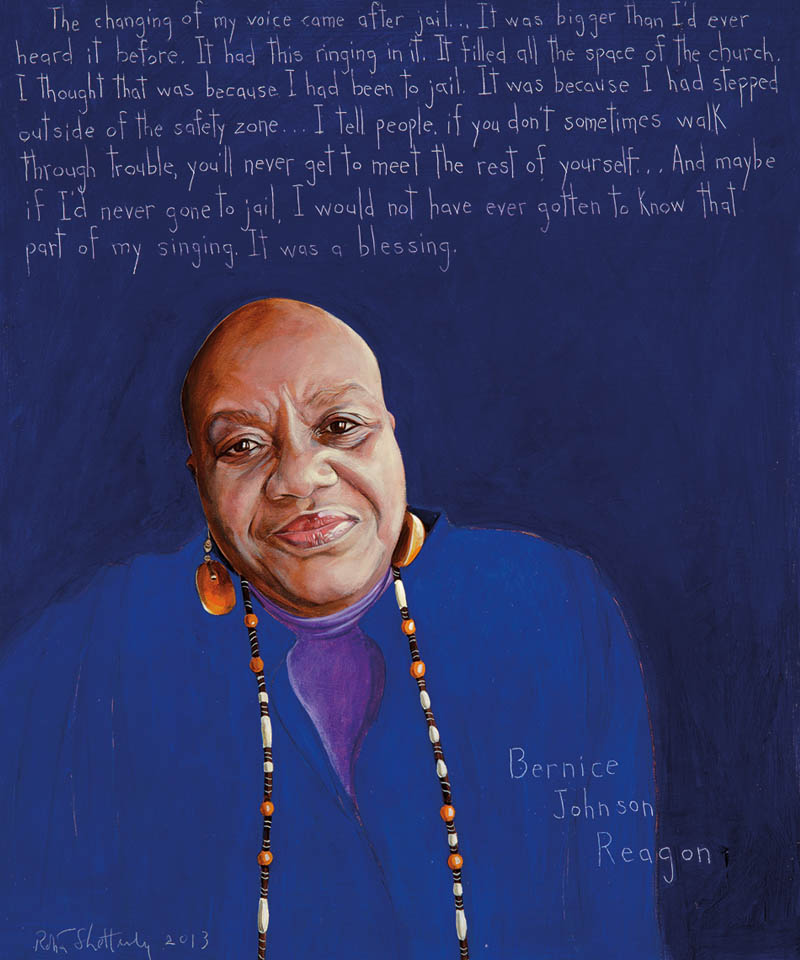
Bernice Johnson Reagon
Singer, Composer, Scholar, Social Activist : b. 1942
“The changing of my voice came after jail. … It was bigger than I’d ever heard it before. It had this ringing in it. It filled all the space of the church. I thought that was because I had been to jail. It was because I had stepped out of the safety zone. … I tell people, if you don’t sometimes walk through trouble, you’ll never get to meet the rest of yourself. … And maybe if I’d never gone to jail, I would not have ever gotten to know that part of my singing. It was a blessing.”
Biography
In 1961, Bernice Johnson Reagon was expelled from Albany State College in southwest Georgia after being arrested and jailed for her participation in a civil rights protest. School officials could not have known they were kicking out a young woman who would go on to become a world-famous singer, composer, scholar, and social activist.
Born on October 4, 1942, Bernice Johnson Reagon grew up in a tight-knit AfricanAmerican community, outside of Albany, Georgia. Her parents, Beatrice and the Reverend Jessie Johnson, raised her and her siblings at the time when unapologetic racism ruled the South. Discrimination ran rampant and educational opportunities were limited for African American children. As the child of a minister, Reagon grew up with a strong sense of the beauty and healing power of music. Her life at home, church, and school revolved around music. She was impressed at an early age by the power of song in the Black choral tradition. This awareness drove her career, in which she has been both a performer and a protector and champion of the traditions she grew up with. Through her work, we learn and feel that strong cultural traditions are a source of power and dignity for oppressed people.
Though she was imprisoned and kicked out of school, Reagon was empowered by her experiences with music and activism. She writes: “As a student leader and activist in the Albany Movement, I sang and stood in the sound of the congregational singing of the freedom songs charging the air we breathed. For the first time, I understood how the singing not only pulled us together, but became our articulate collective testimony to all who stood within the sound.” After her expulsion, she transferred to Spelman College. Soon, she dropped out to become a member of the Freedom Singers, who toured to raise money for the Student Nonviolent Coordinating Committee (SNCC). As a member of SNCC and the National Association for the Advancement of Colored People (NAACP), she participated in voter registration drives and anti-segregation protests.
In 1963, she met and married fellow Freedom Singer Cordell Reagon. They had a son and a daughter together. After divorcing her husband in 1967, Reagon decided to complete her college education. She returned to Spelman and graduated in 1970. She was awarded a Ford Fellowship and moved to Washington, D.C., to earn her Ph.D. in history at Howard University. During this time, she grew as a scholar and an artist, working as vocal director of the D.C. Black Repertory Theater.
In 1973, Reagon founded Sweet Honey in the Rock, an a capella singing group made up of African American woman. While performing with Sweet Honey in the Rock, she became director of the Smithsonian’s Program in Black American Culture, and later, curator at the National Museum of American History. As a scholar, she’s produced books, articles, documentaries, and presentations that preserve and celebrate African American music and culture.
In addition to her academic career, Reagon has over thirty credits as a composer, performer, and producer. She’s been awarded fourteen honorary doctorates and several awards in the arts and humanities. In 1989, she was awarded the MacArthur Genius Grant, a $275,000 award that celebrates “extraordinary originality and dedication in creative pursuits.”
Though she retired from Sweet Honey in the Rock in 2004, Reagon continued to perform. She has described herself as a “songtalker, one who balances talk and song in the creation of a live performance conversation with those who gather within the sound of my voice.”
In an interview with Bill Moyers, she explained the value of African-American culture and tradition: “You might not have money. … But you’ve got this culture that empowers you as a unit in the universe and places you and makes you know you are a child of the universe. When the culture is strong, you’ve got this consistency where black people can grow up in these places with this voice just resonating about our special-ness in the universe.”
Over a lifetime of work, Bernice Johnson Reagon has been inspired to share this powerful message. Her work—as a preservationist, artist, and performer—serves to inspire and empower people all over the world.
Programs
Americans Who Tell the Truth (AWTT) offers a variety of ways to engage with its portraits and portrait subjects. Host an exhibit, use our free lesson plans and educational programs, or engage with a member of the AWTT team or portrait subjects.

Education
AWTT has educational materials and lesson plans that ask students to grapple with truth, justice, and freedom.

Exhibits & Community Engagement
AWTT encourages community engagement programs and exhibits accompanied by public events that stimulate dialogue around citizenship, education, and activism.